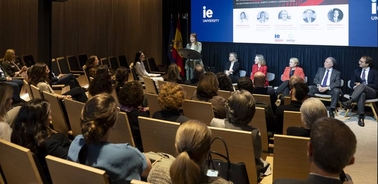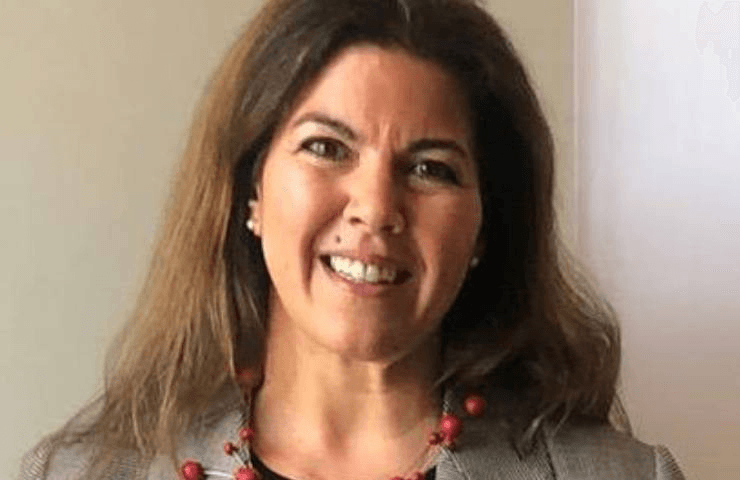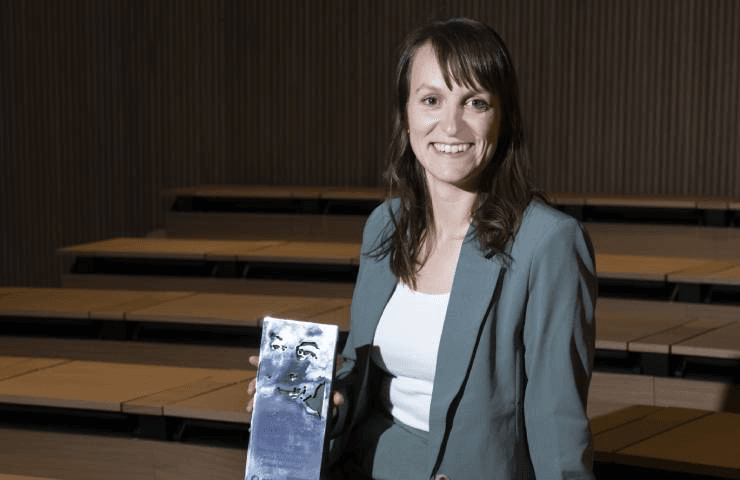- Home
- We Are Law School
- News
- Winners Of The Xviii José María Cervelló Prize Discuss The Legal Challenges Of Sustainability In The Fashion Industry
Winners of the XVIII José María Cervelló Prize discuss the legal challenges of sustainability in the fashion industry

The José María Cervelló Chair is part of the IE Foundation’s initiatives, supported by IE Law School and ONTIER.
On November 7, the José María Cervelló Chair at IE Law School and ONTIER held the 18th edition of the Cervelló Business Law Award, which this year focused on fashion law.
Professor Verónica Ruiz Abou-Nigm from Edinburgh Law School and Doctor Antonia Sommerfeld from the Max Planck Institute for Comparative and International Private Law were recognized for their paper, "Circular Fashion and Legal Design: Weaving Circular Economy Threads into International Contracts." We talk to them to gain deeper insights into their work.
On Winning the XVIII José María Cervelló Prize
"We are deeply honored," expresses the winners. "This award affirms the value of pioneering work at the intersection of private international law and sustainability in the fashion industry. It encourages us to continue pushing the boundaries of interdisciplinary research in pursuit of new insights." They are grateful for the support of their colleagues, emphasizing how this recognition amplifies the reach and impact of their research and simultaneously the visibility of the topic of sustainability in the global fashion industry.
Research Focus: Circular Economy and Fashion Law
The award-winning research addresses the environmental challenges of the highly unsustainable global fashion industry, creating obscene amounts of waste and overuse of natural resources during the production, transportation and disposal processes involved. “A change is urgently needed,” they noted. “In our work, we ask how this change can be initiated and what role law plays in driving it.”
Their analysis combines Circular Economy, Fashion Law, and Private International Law to tackle the sustainability issue of the global fashion industry, and it is conducted in three key steps:
1. Highlighting the potential of circular economy models for fostering sustainability.
2. Creating a taxonomy of existing circular business practices in the fashion industry, with an emphasis on “circular reverse retailing.”
3. Addressing the legal design complexities necessary for cross-border contracting in reverse retailing, illustrating how circular rethinking can overcome challenges and close loopholes.
Key Legal Challenges in Sustainable Fashion
When discussing the primary legal challenges for fashion brands, the winners identified several critical issues. These include navigating complex global supply chains while ensuring compliance with evolving standards and regulations for social, economic, and environmental sustainability.
They added, “Regarding the necessary shift towards circularity in the fashion industry, additional economic challenges exist in creating and sustaining a level playing field between new circular business models and unsustainable linear business practices, especially drop-shipping models.”
Lawyers’ Role in Creating a Sustainable Future
Ruiz Abou-Nigm and Sommerfeld stress the importance of diverse legal expertise in fostering sustainability in the fashion industry. This expertise spans areas such as contract law, tort law, intellectual property rights, and private international law. They remarked, “The shift to circular economy models requires creativity, inclusivity, and commitment to turn the tide.”
In practical lawyer-client consultancy situations, two key aspects should be considered in circular contract drafting, especially in the absence of specific legal rules in substantive private law or private international law. First, contract clauses should address the allocation of circular contractual duties and liabilities, involvement of third parties, and risk distribution, as these areas remain unregulated in current statutes or case law. Second, since joint construction of the initial forward contract and the reverse retailing contract is not ensured under the current linear understanding of the law in most legal systems, a choice of law and forum clause should be included in cross-border contracts which explicitly includes both parts of the circular contract – the initial forward part and the reverse retailing part of the loop.
Advice for Aspiring Fashion Law Professionals
The winners encouraged young legal professionals interested in sustainability and Fashion Law to embrace collaboration: "There is much to be done, and efforts need to be coordinated. Law and lawyers are key, but we must work together with the industry and various disciplines to enable the necessary large-scale transformation that our times urgently demand."
They highlighted the role of global law and legal education in fostering the creative and pluralistic thinking needed to design legal frameworks that support the fashion industry’s transition to circularity.
About the José María Cervelló Chair
The José María Cervelló Chair is part of the IE Foundation’s knowledge-generation initiatives, supported by IE Law School and ONTIER.
In addition to granting the José María Cervelló Business Law Awards, the Chair, with sponsorship from ONTIER, funds the education of postgraduate students in IE Law School’s legal and tax programs based on academic merit and demonstrated financial need.
The Chair’s work also extends to other areas, such as professional ethics education, research, and knowledge dissemination.
About the Award Winners
Professor Verónica Ruiz Abou-Nigm is the Chair of Private International Law at the University of Edinburgh, United Kingdom, and co-Director of the Global Law LL.B. program at Edinburgh Law School. Her research primarily focuses on private international law and sustainable development, global legal education, and international dispute resolution including arbitration. Ruiz Abou-Nigm serves as President of the American Association of Private International Law (ASADIP) and is an elected member of the Scientific Council of the European Association of Private International Law (EAPIL) and the Court of the Permanent Court of Arbitration (PCA) in The Hague.
Doctor Antonia Sommerfeld is a senior research fellow at the Max Planck Institute for Comparative and International Private Law in Hamburg, Germany, and a lecturer at the University of Hamburg. Before assuming her current position, she conducted her legal traineeship working i.e. at the Permanent Mission of the Federal Republic of Germany to the United Nations in New York (U.S.), the litigation department of an international law firm, and the offices of the Research Services of the German Bundestag. She has been a visiting researcher at the University of Cambridge and has lectured at the China University of Political Science and Law in Beijing.

